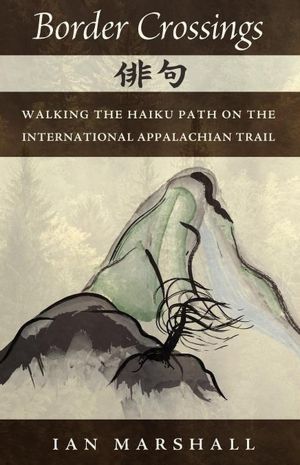Maine chapter board member, Thomas Urquhart has reviewed Ian Marshall’s Border Crossings. You might find it interesting. A portion of the proceeds will go to the IAT so buy a copy and help the IAT!

“Border Crossings: Walking the Haiku Path on the International Appalachian Trail.” By Ian Marshall. Hiraeth Press. 291 pages. $17.95
In 1998, Ian Marshall had finished hiking, section by section, the venerable Appalachian Trail. A professor of English and environmental studies at Penn State Altoona, he also was becoming interested in haiku, those little quintessentially Japanese snippets of acute observation.
Then he heard about the International Appalachian Trail, the brainchild of former Maine Audubon director and state conservation commissioner Dick Anderson. (Full disclosure: I am a member of the IAT board, and also a former Audubon director.) The upshot became a ruminative walk from Mount Katahdin to Cap Gaspe in Quebec, at that time the IAT’s eastern terminus.
The hike was completed two weeks at a time over six consecutive years, and has resulted in "Border Crossings: Walking the Haiku Path on the International Appalachian Trail."
The narrative unfolds day by day, with each chapter given an intriguing title beginning with "The Day of," referring to something that happened, like "The Day of Hitching a Ride with Gravity" or that Marshall experienced, like "The Day of Sunlight Shaped Like an Hourglass" or didn’t experience, as in "The Day of No Moose."
Marshall combines his experiences along the trail with insights into what makes a haiku. The book is studded with his personal efforts in that poetic form.
The inspiration for this exercise was the 17th-century poet and haiku master Matsuo Basho, who in 1689 made a similar journey into Japan’s northern mountains. Basho chronicled his experiences in "Narrow Road to the Deep North," combining with his poems a travelogue full of literary criticism and cultural meditation. The book was Marshall’s constant trail companion, along with his partner (now wife; they married three weeks after reaching Cap Gaspe).
In their tent each evening, Marshall assiduously read Basho, logged their experiences as hikers, and rendered some of them into his own haiku (yes, "hike-u"; Marshall is an inveterate punster). The art of haiku is so tightly and invisibly tied to Japanese literary tradition that conveying the full meaning in English translation is all but impossible. When the form itself jumps the East-West divide, it must remake itself.
I learned a lot about haiku from "Border Crossings" – among other things, that it often contains a mixture of high and low, sublime and ridiculous. I am no expert, but my guess is that such a combination may be the hardest to pull off.
One of Marshall’s attempts that worked for me goes: "clear August night/wishing that first star/would hurry up and shine." As Basho explained three centuries ago, "To jot down such things and relate them to others is one of the true treasures of the journey."
Such "jottings" Basho also likened to the "delirium of a drunk or the rambling of one asleep," and Marshall claims no more. He is delightfully self-effacing as he lays the fruits of his labor before the reader.
Did he succeed in his stated goal of learning to write a "decent haiku" while hiking the International Appalachian Trail? I generally agree with his verdict of "a few times," although he is typically, and perhaps unnecessarily, harsh on himself. There is something really satisfying, as well as charming, about his final verse: "atop the vanquished mountain/a mosquito/atop my hat."
Like its model, "Border Crossings" is a combination of literary discussion, poetry and travel journal. Some of Marshall’s descriptions of the unsung, unheroic aspects of hiking have a welcome freshness.
For example, early on he describes the first moment on a hike when "you are caught up in the rhythm of the walk, unaware not only of the weight of the pack on your back or the thud of each step on the trail but of any conscious thought at all."
Descriptions capture the highlights of the trail with admirable conciseness (what would you expect from a writer of haiku?). And frankness: He is far from complimentary about the condition of stretches of the trail in Quebec (but that was 10 years ago).
Hiraeth Press (from the Welsh, signifying the "deep longing of the soul for one’s original homeland") has produced an elegant book. It includes a glossary of haiku terms to help the reader with unfamiliar concepts.
However, the map at the beginning is inexplicably inadequate for so detailed a log. And the editors could have exercised a firmer hand with Marshall and his companion’s jokey badinage. It becomes a distraction and, in the end, an impediment.
We have all kept journals and noted in them the occasional bon mot that seemed quite priceless at the time but does not stand the test of time. Without them, the really interesting, appealing and original aspects of "Border Crossings" would have shone forth all the more, like "the raspberries we picked along the road to the lighthouse, beacons for our attention."
Marshall continues: "Somehow, though, all these disparate tones blend together in a seamless whole, stitched together by our steps." Well said.
Freelance writer Thomas Urquhart is a former director of Maine Audubon and author of "For the Beauty of the Earth."
